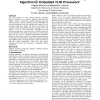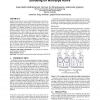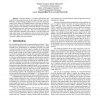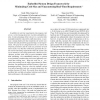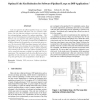120
click to vote
TCAD
2008
15 years 1 months ago
2008
Embedded systems are constrained by the available memory. Code-compression techniques address this issue by reducing the code size of application programs. It is a major challenge ...
115
click to vote
MAM
2006
15 years 1 months ago
2006
The increasingly complicated DSP processors and applications with strict timing and code size constraints require design automation tools to consider multiple optimizations such a...
129
click to vote
CF
2005
ACM
15 years 4 months ago
2005
ACM
This paper evaluates how much extended dictionary-based code compression techniques can reduce the static code size. In their simplest form, such methods statically identify ident...
128
click to vote
CODES
2001
IEEE
15 years 5 months ago
2001
IEEE
The paper proposes a novel software-pipelining algorithm, Register Sensitive Force Directed Retiming Algorithm (RSFDRA), suitable for optimizing compilers targeting embedded VLIW ...
153
click to vote
CODES
2006
IEEE
15 years 5 months ago
2006
IEEE
Small area and code size are two critical design issues in most of embedded system designs. In this paper, we tackle these issues by customizing forwarding networks and instructio...
133
click to vote
ISSS
1996
IEEE
15 years 6 months ago
1996
IEEE
In design of an embedded system with a cache, it is important to minimize the cache miss rate to reduce the power consumption as well as to improvethe performance of the system. W...
143
click to vote
RTSS
2002
IEEE
15 years 7 months ago
2002
IEEE
In addition to real-time requirements, the program code size is a critical design factor for real-time embedded systems. To take advantage of the code size vs. execution time trad...
123
click to vote
ISSS
2002
IEEE
15 years 7 months ago
2002
IEEE
Software pipelining and unfolding are commonly used techniques to increase parallelism for DSP applications. However, these techniques expand the code size of the application sign...
115
click to vote
ICPP
2002
IEEE
15 years 7 months ago
2002
IEEE
Code size expansion of software-pipelined loops is a critical problem for DSP systems with strict code size constraint. Some ad-hoc code size reduction techniques were used to try...

